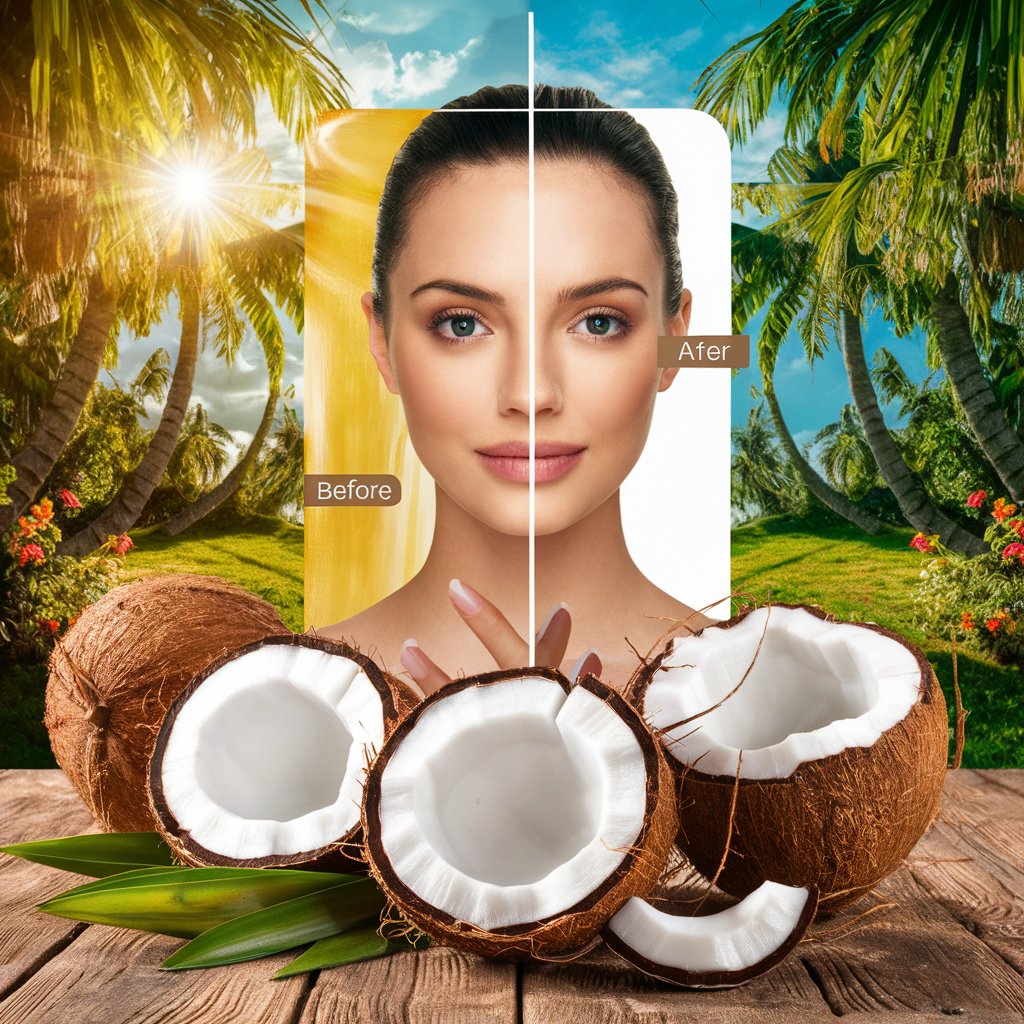Skin lightening is a popular topic in the beauty industry, with many people seeking natural alternatives to chemical products.
Coconut milk in skincare has gained popularity due to its beauty benefits, which include nourishing and moisturizing the skin.
This article will explore how coconut milk can help lighten the skin, provide practical usage tips, and share some effective face mask recipes that utilize coconut milk and skin health benefits.
What is Coconut Milk?
Coconut milk is a creamy liquid extracted from the grated meat of mature coconuts. Unlike coconut water, which comes from the inside of young coconuts, coconut milk is rich in vitamins C, E, B1, B3, B5, and B6.
These nutrients contribute to its moisturizing and anti-inflammatory properties, making it an excellent choice for skin lightening with coconut milk.
Related: Natural Skin Lightening Ingredients You Never Knew Could Lighten Skin
Benefits of Coconut Milk for Skin Lightening
One of the most significant advantages of using coconut milk for skin lightening is that it is a natural and gentle skin lightening ingredient, which reduces the risk of adverse reactions.
- Vitamin C in coconut milk is well-known for its ability to reduce pigmentation and even out skin tone.
- Lauric acid, a medium-chain fatty acid in coconut milk, has antimicrobial properties that help reduce acne and prevent skin darkening from inflammation.
- Antioxidants in coconut milk also fight free radicals, which can cause skin damage and lead to dark spots and hyperpigmentation.
The scientific evidence regarding the effectiveness of coconut oil for skin lightening is limited and mixed.
A study published in the International Journal of Dermatology found that lauric acid significantly reduces acne and related skin brightening treatment.
Another study in the Journal of Cosmetic Science highlights the moisturizing properties of coconut milk, which help keep the skin hydrated and prevent dryness-induced darkening.
This is useful in natural skin lightening remedies, as coconut milk offers a gentle and effective alternative.
By incorporating coconut milk into your skincare routine, you can say goodbye to dull, dark skin and hello to a brighter, more radiant complexion.
Does coconut milk actually lighten the skin?
While coconut oil is known for its moisturizing properties and its ability to improve skin barrier function, there is no strong evidence to suggest that it has significant skin lightening effects.
A study highlighted by Dermatology Times found that virgin coconut oil (VCO) can improve skin hydration and barrier function, making it a beneficial emollient.
It also has antibacterial properties that can help with skin conditions like atopic dermatitis, which can greatly benefit from skin therapy. However, this does not directly correlate to skin lightening.
A review on Dermcollective notes that while coconut oil can improve skin health by increasing cell turnover and reducing inflammation, there are no scientific studies proving its effectiveness in lightening dark circles or hyperpigmentation.
In fact, its comedogenic nature can cause clogged pores and acne, making it unsuitable for many skin types[2].
Remedy for dry skin
Verywell Health emphasizes that coconut oil is best used as an emollient for dry skin and for its antimicrobial properties rather than for skin lightening. It does not support the use of coconut oil as a remedy for pigmentation issues[3].
Overall, while coconut oil has several skin benefits, its efficacy as a skin lightening agent is not supported by robust scientific evidence.
Other ingredients like vitamin C, hydroquinone, or natural alternatives such as lemon juice are more effective[4][5].
If you’re interested in exploring coconut milk skincare, you can try combining it with other ingredients to enhance its brightening effects.
How to Use Coconut Milk for Skin Lightening
Using coconut milk in skincare can be a cost-effective and fun way to take care of your skin.
One way to do it is by creating a homemade face mask using coconut milk fairness-enhancing ingredients.
Also read: Does Coconut Oil Lighten the Skin? What We Know in 2024
You can try incorporating homemade coconut milk skincare routines into your daily regimen for a natural glow.
It’s also worth noting that coconut milk’s brightening effects can be maximized when used consistently and in conjunction with other skincare practices.
- Direct Application: Apply fresh coconut milk directly to your skin using a cotton ball, promoting organic skincare. Leave it on for 20-30 minutes before rinsing off with lukewarm water. Repeat daily for best results.
- Coconut Milk Cleanser: Mix equal parts of coconut milk and rose water, leveraging the principles of natural skin care. Use this mixture as a daily cleanser to help lighten and brighten your skin.
- Coconut Milk and Turmeric Mask: Mix 2 tablespoons of coconut milk with 1 teaspoon of turmeric powder. Apply the mask to your face and leave it on for 15-20 minutes before rinsing off. Turmeric is known for its skin-lightening properties and works well with coconut milk, which is rich in nutrients in coconut milk for skin.
Coconut Milk Face Mask Recipes
Here are some easy-to-make coconut milk face mask recipes that can help you achieve glowing skin and unlock the skin care benefits of this natural ingredient:
- Natural Remedies with Coconut Milk and Honey Mask:
- Ingredients: 2 tablespoons of coconut milk, 1 tablespoon of honey
- Instructions: Mix the ingredients and apply the mask to your face. Leave it on for 20 minutes before rinsing off with warm water. This mask helps to moisturize and brighten the complexion.
- Coconut Milk and Lemon Juice Mask for Dark Spots Reduction:
- Ingredients: 2 tablespoons of coconut milk, 1 teaspoon of lemon juice
- Instructions: Combine the ingredients and apply the mask to your face. Leave it on for 15 minutes before rinsing off. Lemon juice has natural bleaching properties that can help with dark spots reduction.
- Coconut Milk and Aloe Vera Gel Mask for Organic Skin Lightening Methods:
- Ingredients: 2 tablespoons of coconut milk, 1 tablespoon of aloe vera gel
- Instructions: Mix the ingredients and apply the mask to your face. Leave it on for 20 minutes before rinsing off. Aloe vera soothes the skin and helps with organic skin lightening methods.
Coconut Milk and Skin Pigmentation
Using these homemade skin treatments, you can maintain healthy skin pigmentation and achieve a radiant glow.
Coconut milk is effective in reducing even skin tone due to its high content of vitamin C and lauric acid.
Vitamin C naturally lightens the skin by reducing melanin production, while lauric acid reduces inflammation and prevents further darkening.
When used regularly, coconut milk can help lighten dark spots, reduce hyperpigmentation treatment, and provide a brighter complexion.
Compared to other natural beauty remedies, coconut milk is gentle on the skin and provides additional moisturizing benefits.
Precautions and Side Effects
While coconut milk is generally safe for most skin types, performing a patch test before using it on your face is important.
Apply a small amount of coconut milk to a patch of skin on your forearm and wait 24 hours to see if any irritation occurs.
Frequently Asked Questions
1. Can I use coconut milk on oily skin for natural remedies?
Yes, coconut milk can be used on oily skin. Its lightweight texture makes it suitable for all skin types, including oily skin.
2. How often should I use coconut milk for skin lightening as part of my beauty routine?
For best results, use coconut milk for skin lightening 2-3 times a week.
Consistent use over several weeks will help to achieve a noticeable improvement in skin tone, and it’s one of the many homemade beauty treatments you can try at home.
3. Can coconut milk be used on sensitive skin, and are there any skin care hacks I should know?
Coconut milk is generally gentle on the skin, but it is always best to perform a patch test before applying it to sensitive skin.
If no irritation occurs, it can be safely used, and it can even aid in skin renewal.
Conclusion
Coconut milk is a versatile and natural home remedies for brightening skin. Its rich nutritional content helps to reduce pigmentation, even out skin tone, and provide essential moisture to the skin.
By incorporating coconut milk into your skin care routine, you can achieve a brighter, more radiant complexion naturally through diy skin brightening methods.
Try out the suggested methods and face mask recipes to experience the benefits of coconut milk for yourself, an effective way to achieve chemical-free skin lightening.

I’m a devoted organic skincare enthusiast, passionate about the natural, wholesome goodness that organic products bring to our skin.
Organic skincare isn’t just a hobby for me—it’s a lifestyle. Every product I use, recommend, and write about has been carefully chosen for its purity and effectiveness. Everything I write about is backed by scientific studies, dermatologists’ opinions, and user experiences.
I also excel at tackling skincare challenges with innovative, organic solutions.


